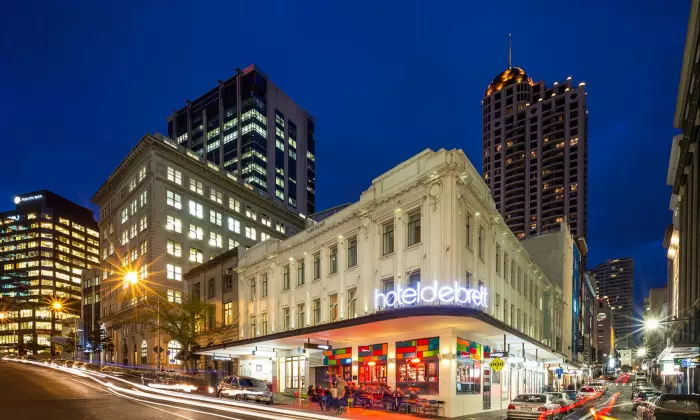At three storeys, the Hotel DeBrett is overshadowed by most of its Shortland St and High St neighbours, and certainly by the new breed of tower hotels springing up in the Auckland city centre.
But while the art-deco-style property is eclipsed in stature by the nearby SO/, Hotel Britomart and Voco offerings, it holds its own as part of the epicentre of the city’s social and fashion scene.
The boutique five-star hotel, bought by private group Habitat Hotels and Apartments last September, has the honour of being the city’s first public house.
Its original version opened its doors in 1841 as the Commercial hotel – the first place in Auckland you could get both a beer and a room for the night.
The original timber buildings were destroyed by fire in 1858.
The present building was opened in 1925 and bought in 1953 by Dominion Breweries, which modernised it and, in 1959, gave it the name DeBrett.
Drinking hole
Part of DB's upgrades included the opening of a trial garden bar, which meant men could drink while seated instead of standing, as had been the tradition since 1917.
The site’s attached Corner Bar has remained as one of the CBD's favourite watering holes ever since, while the understated DeBretts Kitchen, next-door atrium and house bar are a favourite location for quiet discussions involving inner-city lawyers, property developers and business journalists.
Habitat invited BusinessDesk to spend a night at the DeBrett just before Christmas. After we checked in, the first step was into the blinged-out elevator, a cascade of tiny mirror tiles and brass – sensory overload if you've had a few in the bar first.
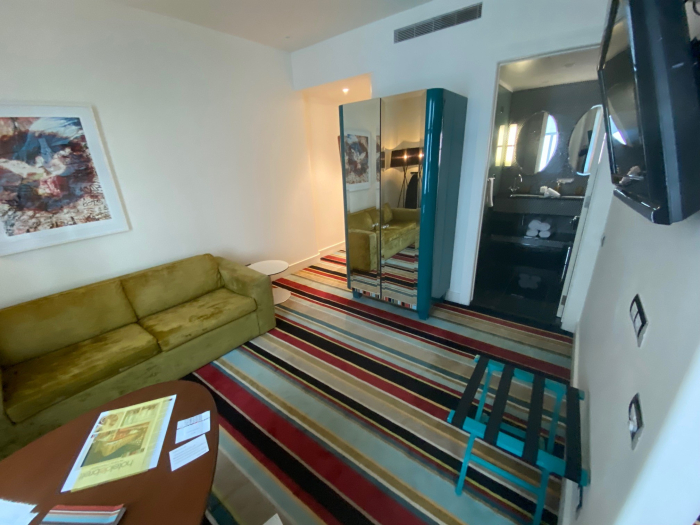 Every room is bespoke. (Image: BusinessDesk)
Every room is bespoke. (Image: BusinessDesk)The visual assault continued down the hallway to the suites, with striped carpet and tubular lighting outside each room door creating a slightly surreal experience, but it is pretty cool.
The hotel's main cues are art deco, and all the rooms are bespoke, with slightly different configurations and local artwork. The only common features throughout are the stripey green, red, white and brown carpet, underfloor heating and soundproofing.
It's just as well the latter has been installed given how noisy the CBD can be, but it means you can't open the windows and have to rely on air-conditioning for airflow.
Hero of the suite
There's scarcely not a spot you can stand in your room without catching your reflection. Even the wardrobe by the entrance includes full-length mirrors, with retro glass door knobs. The wardrobe houses two ultra-comfy bathrobes; for once, I found one that actually fitted me.
But the hero of the suite is the bathroom, which includes mosaic black round tiles, another feature of the art-deco era.
It also includes a sunken bathtub and a walk-in shower – next to a toilet partitioned off by frosted glass walls, presumably in case your partner is using the double-sink vanity.
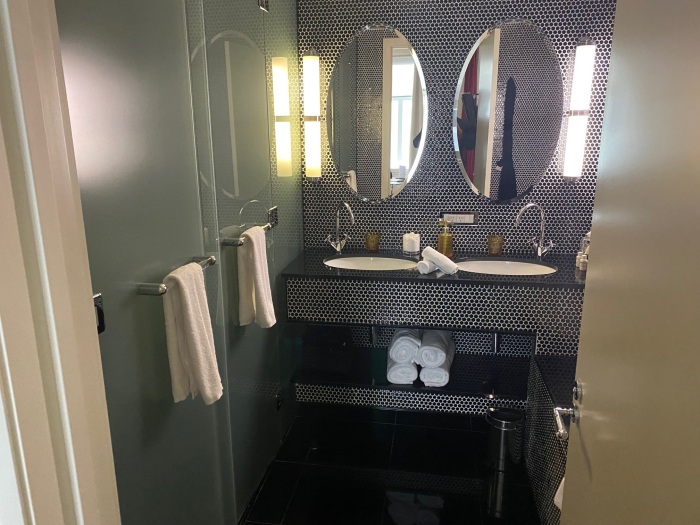 The art deco-style bathroom. (Image: BusinessDesk)
The art deco-style bathroom. (Image: BusinessDesk)New chef
Habitat, which also operates the Auckland and Wellington Ohtels, brought on board a new head chef, Nicholas Holland, to take on the DeBretts Kitchen in December.
Formerly with nearby Vivace and a long-serving tutor in culinary arts at Auckland’s Management Academies (NZMA), Holland wanted to recreate a "nostalgic" yet modernised menu, tapping into mid-century inspiration with a Kiwi spin.
That’s reflected immediately in the range of dinner entrées, which include a Kikorangi blue cheese soufflé, with a watercress marmalade and a cockle bouillabaisse.
The mains range from a chervil-crusted lamb rack with fennel and saffron purée and market fish with chilli lemon and horopito risotto, to globe artichoke with roast garlic and ratatouille stack. Prices range from $28 to $37 – pretty much mid-range for Auckland central restaurant fare.
Because BusinessDesk's overnight stay coincided with our staff end-of-year party, I was attentive to what was on the breakfast menu the next day.
I opted to follow the lined carpet stairs down rather than risk seeing myriad images of myself in the lift, and headed to the rather lovely, and spacious, atrium for an urgently needed coffee.
Tipsy tea
We were summoned to our table in short order for rather excellent eggs benedict with smoked salmon and spinach ($25) and French toast ($21), the latter served with a strawberry compote, black pepper and mascarpone.
The hotel also offers a popular "roaring 20s" high tea, at $59 per person on weekends from lunch to 4pm, including classic savouries such as smoked salmon pinwheels, devilled eggs and prawn cocktails. If you are up for a slightly more "flappers and dappers" style experience, at $79, guests can enjoy "tipsy tea", which throws in some classic Prohibition-era drinks (think Bees Knees, Mary Pickford and strawberry Rickey).
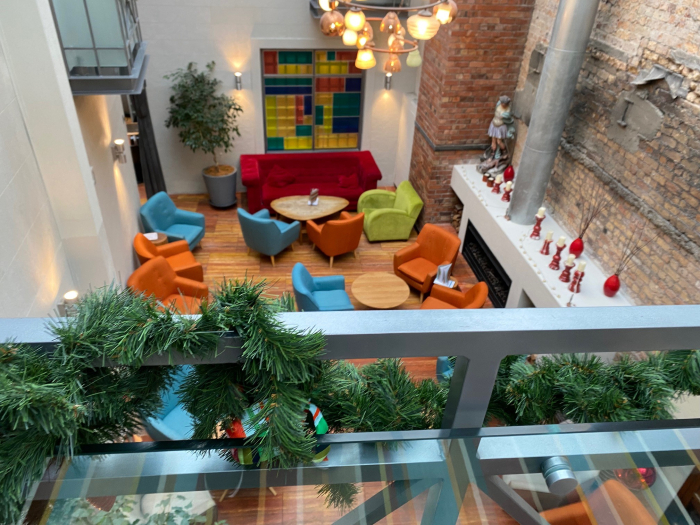 The atrium, a quiet refuge from the CBD. (Image: BusinessDesk)
The atrium, a quiet refuge from the CBD. (Image: BusinessDesk)
Future plans?
There aren't any changes planned, says Habitat managing director Adam Cunningham.
“It is a beautiful property as it stands, so the best we can hope for is to add bits to the edges to make it even better.
“If you look at our property down at the Viaduct, Ohtel, it’s similar but totally different but still focusing on a unique local experience.
"I feel a little bit like a museum curator: I am looking after something that will be here long after me and my job is to look after it as well as I can.”
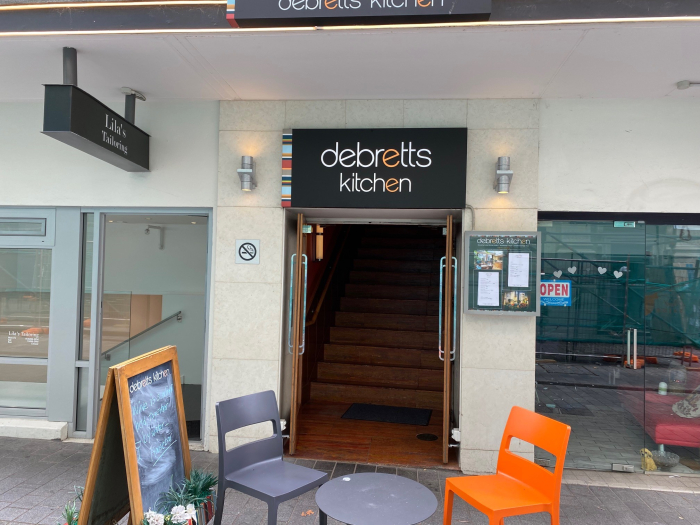 The more-subtle O'Connell St entrance to DeBretts Kitchen, a favourite for discreet discussions. (Image: BusinessDesk)
The more-subtle O'Connell St entrance to DeBretts Kitchen, a favourite for discreet discussions. (Image: BusinessDesk)


